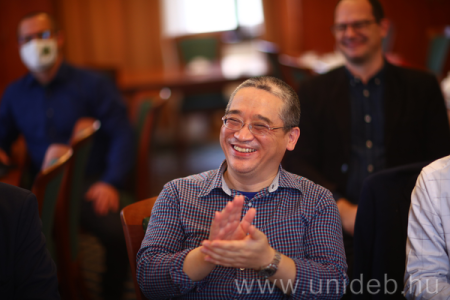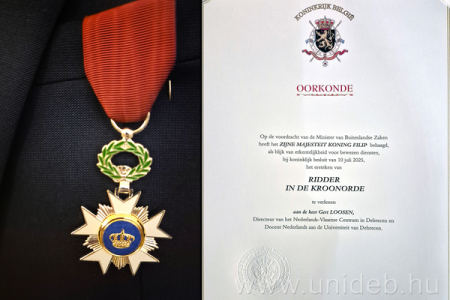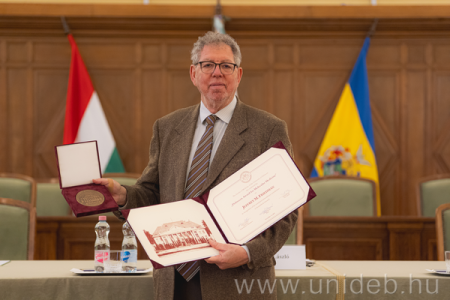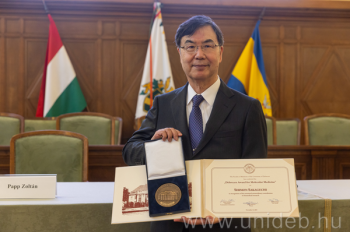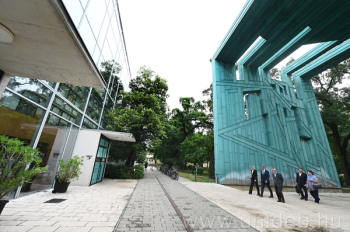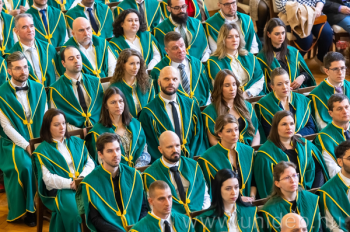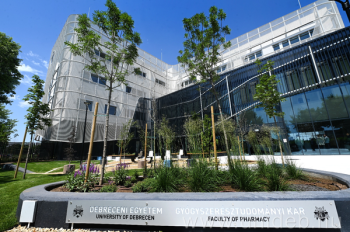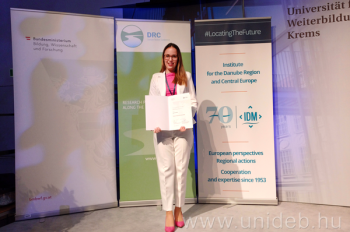The Chinese director of our Confucius Institute (CI) at the Faculty of Arts of the University of Debrecen has become the recipient of a highly prestigious recognition. In 2025, the leadership of Tianjin Foreign Studies University honored Professor Cui Xianjun by awarding him the title of Best Chinese Director of the Year in the pool of directors from as many as seven CIs that they operate as partner institutions.
Hírek Award címkével
Gert Loosen has received a prestigious award and high honor from the monarch of Belgium for his outstanding work in expanding and improving Hungarian-Belgian cultural and professional relations. Assistant Professor at the Institute of German Studies at the Faculty of Humanities of the University of Debrecen and Director of the Dutch-Flemish Center in Debrecen, Professor Loosen received the Knight’s Cross of the Order of the Crown on December 9 at a ceremony held at the Embassy of the Kingdom of Belgium to Hungary.
The Faculty of Medicine of the University of Debrecen awarded this year’s Debrecen Prize for Molecular Medicine to molecular geneticist Jeffrey M. Friedman, a medical researcher at the Rockefeller University of New York. The professor and his colleagues identified leptin, a hormone produced by adipose tissue, which plays a role in regulating body weight. Professor Jeffrey M. Friedman received the award at a ceremony held at the University of Debrecen on Tuesday, after which he gave a lecture on the causes and treatment options of obesity.
This year's Nobel Prize in Physiology or Medicine goes to Mary E. Brunkow and Fred Ramsdell of the United States and Shimon Sakaguchi of Japan. In 2023, the Japanese professor's scientific work was recognized with the Debrecen Award for Molecular Medicine by the Faculty of Medicine at the University of Debrecen. Since the award was established, the professor at Osaka University is the third recipient to receive a Nobel Prize.
Topics such as the harmonization of traditional Chinese medicine (TCM) with medical research, the role of artificial intelligence and network pharmacology, as well as opportunities in next-generation pharmaceuticals and theranostics, were discussed at the Doctor Honoris Causa Symposium on Thursday. At the scientific session, Professor Shao Li– member of the European Academy of Sciences and Arts and Director of the Interdisciplinary Research Institute of Traditional Chinese Medicine at Tsinghua University – presented his research findings. He received an honorary doctorate from the University of Debrecen on Friday.
The University of Debrecen was named University of the Year in the student-friendly category at the first-ever awards gala, where Chancellor Zoltán Bács received a special ministerial prize for his professional work. At the ceremony, the Ministry of Culture and Innovation honored Hungarian universities in as many as eight categories.
As many as 96 newly-hooded Ph.D.-s of the University of Debrecen (UD) took their oath and received their PhD degrees last Saturday. The titles habilitated doctor and the awards Count István Tisza Foundation for the University of Debrecen - University of Debrecen Publication Awards (Gróf Tisza István Debreceni Egyetemért Alapítvány (GTIDEA)–Debreceni Egyetem Publikációs Díj) were also conferred and presented at a ceremony in the venue called Aula of our Main Building.
The new building of the Faculty of Pharmacy at the University of Debrecen has been awarded a prestigious architectural recognition at the international competition BIG SEE Opening Perspectives 2025 in the category Educational Buildings. The National Manufacturing, Research and Education Central Plant and Faculty Building was awarded first place for innovation, intelligent design, originality, environmental sensitivity, sustainability, cultural and social awareness and functionality.
It was an assistant professor of the Department of Molecular and Nanopharmaceutics at the Faculty of Pharmacy of the University of Debrecen who became the recipient of the prize named Danubius Young Scientist Award 2024 from Hungary. Ágnes Rusznyák's chief research interests include the cellular effects of cyclodextrins and RNA carrier activity. Her findings have been published in several scientific journals.
Gábor Pusztai, head of Dutch Studies at the Faculty of Humanities of the University of Debrecen (DE), has received a prestigious Dutch award. The Ridder in de Orde van Oranje-Nassau (Knight of the Order of Oranje-Nassau) was presented by the Ambassador of the Kingdom of the Netherlands to Hungary on behalf of King William-Andrian.
